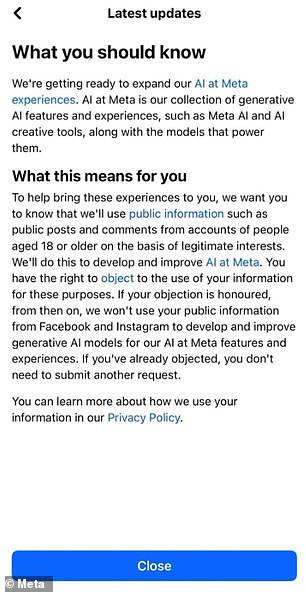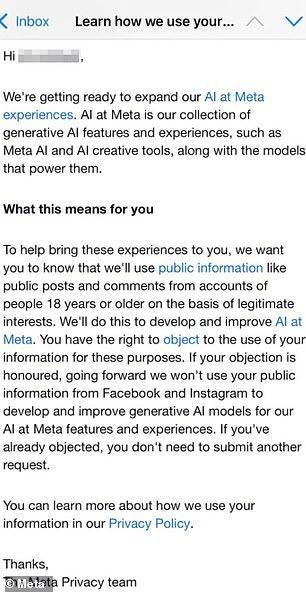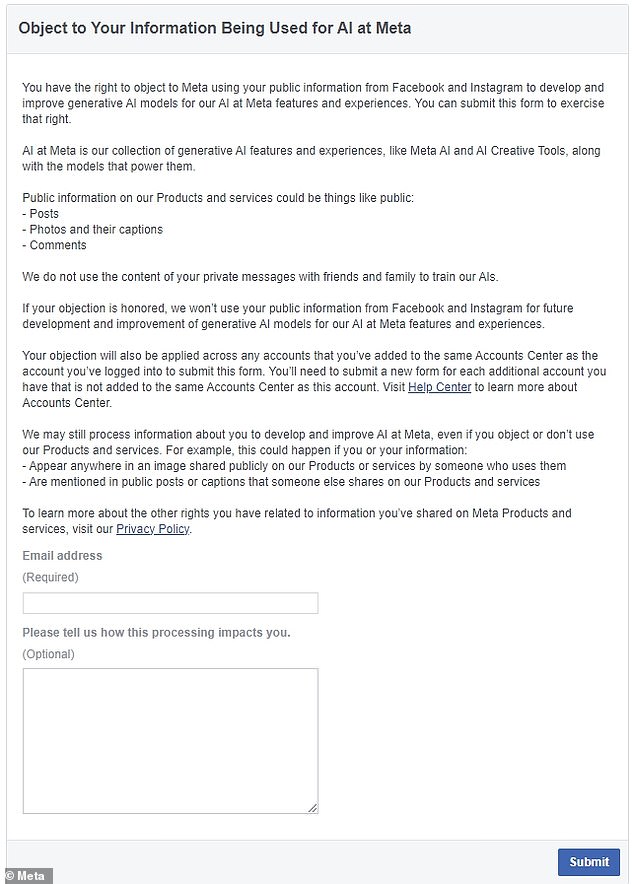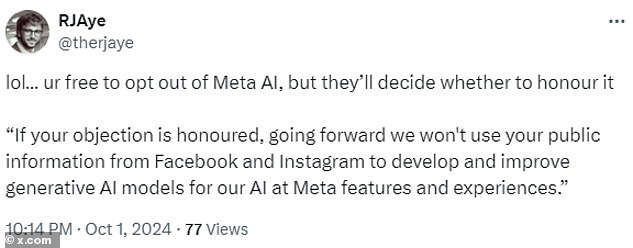Facebook and Instagram users are outraged by the controversial Meta AI movement – here’s how to opt out
Meta has started notifying Instagram and Facebook users across the UK that it’s training its AI with their posts – and people aren’t happy about it.
In emails and notifications sent to UK users, Meta says it uses messages, comments, photos and even captions to help develop its human-like ‘generative AI’, similar to ChatGPT.
By being trained with UK user data, Meta told MailOnline that the AI will ‘reflect and understand British language, geography and culture’.
Social media users are furious about the controversial move, with one person saying the tech giant can ‘start straight away’.
If you do not want your personal data to be transferred to Meta’s AI training program, you can object to this.
Meta, the owner of social media platforms Facebook and Instagram, will use your posts to train its artificial intelligence (AI) models (file photo)
Meta said that the project – which was described in a blog post last month – only applies to adults (people aged 18 and over) using Facebook and Instagram in the UK.
This week, Instagram users noticed a notification that read: “We’re planning new AI features for you. Find out how we use your information.’
Once you tap the notification, you’ll be taken to a 160-word statement confirming the move and explaining it in more detail.
“We’re getting ready to expand our AI at Meta experiences,” it says.
“AI at Meta is our collection of generative AI features and experiences, such as Meta AI and creative AI tools, along with the models that power them.
“To help provide you with these experiences, we want you to know that we will use public information, such as public posts and comments from accounts of people 18 years or older, based on legitimate interest.
‘We will do this to develop and improve AI at Meta.’
Instagram users will also receive an email with the statement, titled “Learn how we use your information as we build AI at Meta.”
Speaking to MailOnline, a spokesperson said Meta uses both Instagram and Facebook posts and comments, as well as photos and their captions, to train the AI – but not the content of private messages.
Furthermore, only publicly available information is used, so if you have a private Instagram account it will not be used.
Former British Deputy Prime Minister Nick Clegg – now chairman of global affairs for Meta – said the messages are taken from profiles of adults in Britain and Brazil.
However, Meta – owned by Mark Zuckerberg – is reportedly angering privacy authorities around the world by quietly scraping user data in other countries as well.
According to the New York TimesMeta gets what it needs from US user posts, but due to less stringent privacy laws, the tech giant doesn’t have to notify people.
Meanwhile, Melinda Claybaugh, Meta’s global privacy director, admitted that this is the case also happens to Australian userswithout an opt-out option, ABC reports.
In response, Meta told MailOnline that it is training its AI models “globally and in countries where the product is/has been rolled out.”
The product, which is similar to OpenAI’s ChatGPT, is a chatbot that Meta describes as your “go-to creative assistant” with “conversational capabilities and image analysis features.”
It has been released in the US, Canada, Australia, New Zealand and other countries, but not in the UK or Europe due to regulatory hurdles.


Instagram users are being sent information about the controversial move to use customer data to train their artificial intelligence (AI) models

The product, which is similar to OpenAI’s ChatGPT, is a chatbot that Meta describes as your “go-to creative assistant” with “conversational capabilities and image analysis features.”
Luckily for Brits, you have the right to opt out, although the process may take some time.
On Instagram you can do this by going to the Privacy Centerwhile on Facebook you have to navigate to the privacy policy.
If you received the Instagram notification or email, you can also click/tap a URL link in the word ‘object’.
You will need to complete a form telling Meta why you object to your posts being used in this way.
Meta told MailOnline it will honor all appeal forms.
But even if you opt out, your information may still be used to train Meta’s AI models, through data collected from other users who have shared your information. Consumer Champion Which one? points out.
For example, this could be an image of you shared by someone else, or you being mentioned in someone else’s posts.

You will need to complete a form telling Meta why you object to your posts being used in this way – although your objection may not be approved
According to X user @Tantacrulpeople who have completed their objection must enter an email code in order to submit the objection correctly.
Although his appeal was upheld, @Tantacrul pointed out that other users were getting an error message, making it unclear whether they had to do it all over again.
@Tantacrul also suggested that Meta made the whole process as difficult as possible so that fewer people would object and call it ‘ugly’.
Other users went to X to complain about Meta’s initiative and the appeal process.
One posted: ‘lol… you are free to choose Meta AI but they will decide whether to honor it.’
Another said: ‘I don’t trust Meta one bit and I’m even more skeptical that AI will benefit any of us,’ adding that Meta can ‘fuck straight away’.

Former Deputy Prime Minister Nick Clegg, now president of global affairs for Meta, also confirmed the change on X (Twitter)

Social media users took to X to complain about the entire initiative and appeals process

Another said: ‘I don’t trust Meta one bit and I’m even more skeptical that AI will be useful to any of us,’ adding that Meta can ‘fuck straight away’
Someone else said: ‘Meta wants you to beg them not to train their AI on your stuff – at your discretion.
‘Wait until literally every DPA (Personal Data Protection Act) does something about this nonsense.’
Users are already protesting by reposting a viral image to Instagram Stories, although contrary to many thought, the protest is not legally binding in any way.
The Information Commissioner’s Office (ICO) has said it has not given regulatory approval for Meta’s plan but will monitor the process.

